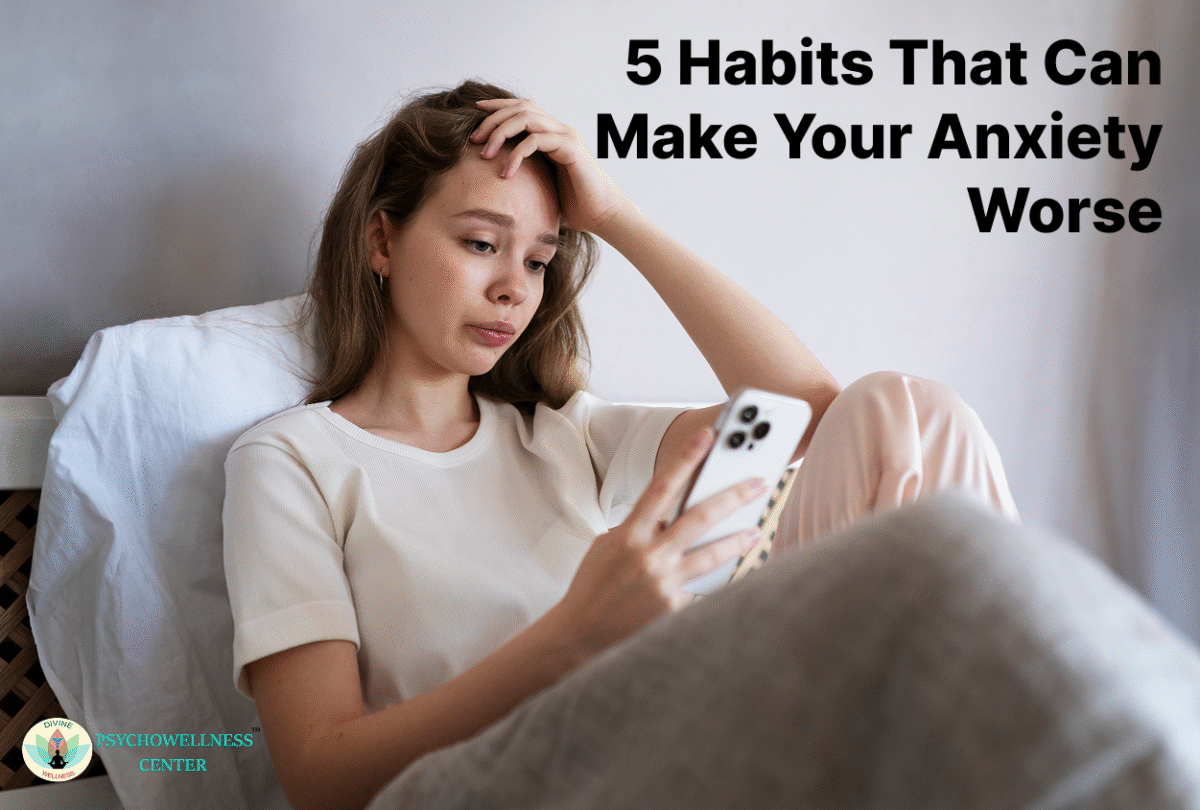While occasional anxiety is a natural response to stress or uncertainty, persistent or excessive anxiety can interfere with daily life. Often, we unknowingly engage in habits that aggravate anxiety rather than soothe it. Recognising these habits is the first step toward managing anxiety more effectively. We’ll look at five typical behaviours that can exacerbate anxiety in this blog and offer doable solutions to stop the pattern.
- Catastrophic Thinking
Catastrophic thinking, also known as “catastrophizing,” involves imagining the worst-case scenario in any given situation. For instance, a minor mistake at work may lead someone to believe they’ll be fired, lose their home, or face lifelong failure.
How it worsens anxiety:
This mental habit keeps the brain in a constant state of alert, triggering the body’s stress response repeatedly. Over time, this can lead to physical symptoms like rapid heartbeat, fatigue, and digestive issues.
What to do instead:
Practice cognitive restructuring—challenge irrational beliefs by asking yourself:
- What evidence supports this thought?
- What would I say to a friend thinking this way?
Grounding techniques and mindfulness also help bring awareness back to the present.
Try This: Write down your anxious thoughts and then list out more realistic outcomes for each. Seeing it in writing often makes the fear feel more manageable.
2. Avoidance Behaviour
Avoiding situations, people, or responsibilities that trigger anxiety may offer temporary relief, but in the long run, it reinforces fear and limits personal growth.
How it worsens anxiety:
Avoidance prevents exposure to feared situations, which means the brain never learns that those fears may be unfounded. It feeds the cycle of anxiety and reduces your confidence in handling challenges.
What to do instead:
Use gradual exposure techniques with the help of a therapist. Facing small parts of what you fear can help build resilience and reduce anxiety over time.
Example: If social gatherings make you anxious, start by attending for just 10 minutes, then gradually increase the time.
3. Excessive Caffeine or Sugar Intake
That extra cup of coffee or sugary snack may feel comforting in the moment, but it could be quietly amplifying your anxiety symptoms.
How it worsens anxiety:
Caffeine stimulates the nervous system, increasing heart rate and triggering the same physiological responses as anxiety. Sugar causes blood sugar spikes and crashes, which can lead to irritability, fatigue, and mood swings.
What to do instead:
Limit your intake of caffeine (especially after noon) and replace sugary snacks with protein-rich alternatives that stabilize blood sugar. Hydration and balanced nutrition go a long way in regulating mood.
Tip: Switch to herbal teas like chamomile or lemon balm, which have calming effects on the nervous system.
4. Doom Scrolling and Excessive Screen Time
Spending hours consuming negative news or scrolling through social media can create a distorted view of reality, increasing fear, comparison, and helplessness.
How it worsens anxiety:
Social comparison on platforms like Instagram can also harm self-esteem and trigger social anxiety.
What to do instead:
Set boundaries around screen time. Choose specific times to check news or social media, and prioritize in-person interactions or activities that bring joy and relaxation.
Try This: Use an app tracker to monitor your screen time and set daily limits. Replace screen time with reading, journaling, or nature walks.
5. Poor Sleep Hygiene
Chronic sleep deprivation doesn’t only leave you feeling tired—it also intensifies the brain’s reaction to stress and makes emotional control more challenging.
How it worsens anxiety:
Lack of quality sleep increases activity in the amygdala (the brain’s fear center), making anxious responses more likely. Over time, this can create a cycle of insomnia and anxiety that is difficult to break.
What to do instead:
- Practice good sleep hygiene:
- Stick to a regular sleep schedule
- Avoid screens at least 30–60 minutes before bed
Tip: Try journaling for 5 minutes before bed to release anxious thoughts and promote mental clarity.
Conclusion
Anxiety often feels overwhelming, but with awareness and small lifestyle adjustments, you can begin to reduce its intensity. Start by identifying which of these five habits you engage in most and take one small step toward change. Over time, even subtle shifts in behaviour can lead to significant improvements in how you feel.
If your anxiety is persistent or interfering with daily life, seeking professional help from a psychologist or counsellor is a powerful step toward healing. Therapy can help identify the root causes of anxiety and equip you with personalised strategies for lasting relief.
Call 011-47039812 or 7827208707 to schedule a consultation at the Psychowellness Center, which is situated in Janakpuri or Dwarka. This will be the first step toward a more balanced and satisfying existence. For those seeking the convenience of online therapy tailored to emotional concerns, support is also available through the TalktoAngel platform.
Consult Dr. R.K. Suri, a leading clinical psychologist, and Ms.Sangeeta Pal, a renowned counseling psychologist and life coach.
References
- American Psychological Association. (2023). Anxiety. https://www.apa.org/topics/anxiety
Harvard Health Publishing. (2021). Understanding the stress response. https://www.health.harvard.edu/staying-healthy/understanding-the-stress-response
- Simmons, M. M., & Gonzalez, A. (2022). The role of cognitive distortions in anxiety disorders: A review. Cognitive Therapy and Research, 46(3), 450–465. https://doi.org/10.1007/s10608-021-10258-9

